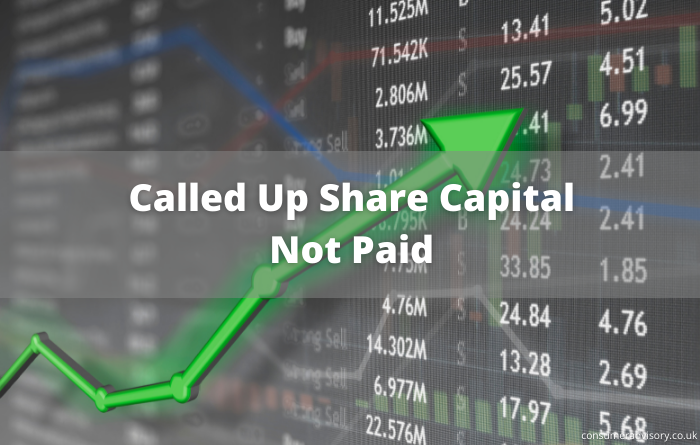
Called up capital not paid? Don’t worry, we’re here to explain it.
Whilst paid up share capital is share capital that has already been paid for in full, called up share capital has not yet been paid for. However, the issuing entity will have already requested payment for the share capital.
In this article, we’ll explain everything you need to know about called up share capital, including what it is, why it isn’t paid and how this type of share capital differs from paid up share capital.
What Is Share Capital?
One way of financing a business is to sell shares in the company. The money that is raised through the sale of these shares or stock is known as share capital. You might also hear it referred to as equity financing.
The amount of share capital that a company has will vary over time with new public offerings. That’s why a company’s share capital will be constantly changing, as shares are purchased and sold.

Types Of Share Capital
There are two types of share capital that you need to be aware of – called up share capital and paid up share capital. Whilst these two types of share capital may sound very similar, there are some key differences between the two – mainly in their funding. Let’s take a look at each of these types of share capital.
Called Up Share Capital
Called up share capital, sometimes referred to as issued share capital, is the total amount of shares that have currently been issued to shareholders, but not necessarily paid for in full. This will include both fully paid and partly paid shares.
Paid Up Share Capital
Paid up share capital is the total amount of share capital that has already been purchased by shareholders completely with cash or other assets. It does not include outstanding debt owed to creditors, which would be a liability.
The Difference Between Called Up Share Capital And Paid Up Share Capital
Called up share capital refers to that part of issued share capital that has already been requested but not yet fully paid for by shareholders. So called ‘called’ because the company has already requested payment for this share capital.
However, there’s a difference between called up share capital and paid up share capital. Whilst both types of share capital are calculated at the same time, only the issued amount is actually counted when calculating a company’s assets and liabilities. This is because it represents that value that can actually be redeemed or sold in a liquidation event. Any debt owed to creditors isn’t considered in these calculations.
Why Is There A Difference Between Called Up Share Capital And Paid Up Share Capital?
In most cases, there will have been delays within the payments process for either market forces or business reasons – or both – before called-up shares have been fully paid over by shareholders. Examples might include:
-A business having to first sell some assets before paying for capital;
-The particular share attracting a price that is higher than the one set by the company, meaning they can’t afford to pay it in full;
-The investor not wanting to purchase all of the shares available. This decision will be influenced by many factors, including their investment strategy.
Whether or not you agree with this type of financing system, called up share capital raises money for companies every day and provides businesses with an alternative way of raising finance. This is why it’s important that you fully understand what called up share capital means, along with how it’s calculated so that your business isn’t left at risk due to incorrect calculations resulting from poor knowledge.
Learn more about active proposal to strike off here

What Happens To Unpaid Share Capital?
In the event that called up share capital isn’t fully paid for by shareholders, the company will have to purchase or redeem these shares in order to give them back to their rightful owners. If this is not possible due to a lack of funds, the directors could be forced legally to buy back and retire some of these owned but unpaid share capital.
Called up share capital is part of issued share capital, which is why it’s important that you understand all aspects when checking your company’s accounts. The best way to ensure that you’re always aware of this type of financing is to speak with a qualified accountant.
Does Share Capital Have To Be Paid Up?
It depends. If a company is looking to be listed on the stock market, they will need at least 25% of their share capital paid up before it can be released upon the open market. But if your business isn’t planning on going public, then there is no legal obligation for you or anyone else to pay up in full or remove money from their bank account and put it into yours.
If you’re unsure about what this means and why it’s important in business finances, it’s always best to speak to a qualified accountant for help and advice.
How Do I Record Unpaid Share Capital?
You can record this type of financing in either debtors or creditors depending on whether the shareholder is owed money by the company or vice versa. But if you’re unsure how long these shares have been left unpaid for, then it’s better to err on the side of caution and enter them as creditors since they will most likely turn into a bad debt at some point during business operations. If the date that a company buys back their own shares or issues new ones is on the same day as they record them on your balance sheet, then you should record this type of financing as a creditor on the liabilities column.
If you have any doubts when it comes to recording your business’ finances, we’d always recommend consulting with a qualified accountant. They can provide you with expert advice and ensure that your balance sheet stacks up.
Can You Transfer Shares That Are Not Fully Paid?
Yes, it’s possible to transfer shares if they are still in the company’s name but have not been paid up. However, you won’t be able to sell these shares or take money from your business account for them until this type of financing has either been repaid by shareholders or removed by the company directors.
When you factor in that most businesses know exactly who their shareholders are and how much they owe them, there is no reason why you would need to record these unpaid share capital balances on your balance sheet summaries unless they’ve already started being used as a form of business finance.

Do Shares Have To Be Fully Paid Before They Can Be Issued?
Again, it depends. If you’re looking to go public by selling shares on the stock market, then there is a legal requirement for them to be at least 25% paid up before they can go out into the open market. But if this isn’t something that your company is planning on doing, then there is no need for these rules and regulations to apply.
And if your company does not wish to go public, there is no legal requirement for more than the minimal amount of share capital to be paid up before they are issued.
It’s worth noting here that any shares bought back or redeemed by a company will produce an expense which will decrease shareholders’ funds. There is no unlimited access to unpaid share capital since all companies have finite resources and it is often difficult for them to pay these off due to lack of cash flow; however, some directors may still give themselves this type of financing even though they know there is no way their company can afford it at that point in time.
You’ll find out whether this type of financing has been allowed by reading through set of accounts and making a note of it in the financial notes. If your company’s issued share capital is less than their stated value, you’ll notice that this type of financing has been given to directors and shareholders (and may even be repaid by them at a later date).
If you’re required to produce statutory accounts for your business which includes segmental reporting, then you can expect to include unpaid share capital as part of other current liabilities on your balance sheet. If the shares only have nominal values (the cost price paid for these shares), then they won’t affect net assets too much and won’t make any major changes to equity or total equity.
Is Unpaid Share Capital A Current Asset?
Yes, this type of financing would be considered as a current asset since you can use it to offset against creditors if any money is due from your business. This is why you should always see unpaid share capital included on the liabilities side of your balance sheet’s assets column.
It’s worth noting too that this type of financing is often referred to as part of equity and can be excluded from both assets and liabilities on your balance sheet. But since it is considered a form of business finance, unpaid share capital must still be included in one way or another even if it doesn’t affect the final balance.
You’ll come across this term when you compare your company’s income statement with their cash flow statement which will help you to better understand the reasons why money came into (or left) your business during the course of its trading cycle.
Can You Cancel Unpaid Shares?
Yes, this is possible but you should always remember that any shares which are cancelled are usually redeemed by the company for their original value. If your company chooses to cancel unpaid shares then it will be listed on your income statement as an operating cash flow so may not appear as a line item on your balance sheet.
Before cancelling these shares, directors must first decide whether or not they can afford to pay them off in full and you’ll find out whether this has happened if the amount of share capital issued has been repaid along with interest (normally at 10%).
In Summary
Share capital is a type of financing that companies can use to raise money and grow their business. When deciding how much share capital you need, it’s important to consider the difference between called up and paid up. Ensure your company has enough cash reserves for emergencies through not only retained earnings but also from investments in callable shares if necessary.
Remember, when considering what called up share capital not paid means, overusing this type of funding could put pressure on your finances as well as give more power to shareholders who don’t have an incentive or stake in the long-term success of your company like employees do. For these reasons and others like them, we recommend following our advice above, as well as consulting with a qualified accountant, before taking any steps towards raising new funds with share capital.
